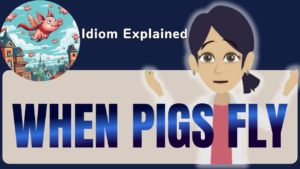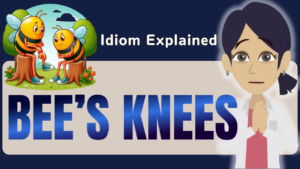Ever wondered why flies are suddenly part of a conversation about kindness?
Describes someone extremely gentle and harmless, who would never intentionally cause harm to anyone or anything, even something as small as a fly.
This common English idiom often puzzles language learners when taken literally.

In reality, it has little to do with actual insects and everything to do with describing a gentle personality.
If you’re looking to expand your English vocabulary and use idioms naturally, you’ve come to the right place. This blog will help you fully grasp “wouldn’t hurt a fly” so you can speak with confidence, while offering examples that reinforce its kindhearted connotation.
Understanding This Idiom
“Wouldn’t hurt a fly” is used to describe someone who is so gentle and harmless that they wouldn’t dream of causing harm, even to the smallest creature.
Whether you’re talking about a close friend who remains calm under pressure or a family member whose patience seems endless, this idiom underscores a person’s caring nature.
It doesn’t matter if the individual in question is strong, shy, or outspoken.
When you say someone “wouldn’t hurt a fly,” you’re emphasizing their gentle character and their unwillingness to resort to aggression in any situation.
Why This Idiom Matters
Idioms bring color and depth to your conversations. They offer nuances that standard phrases simply cannot match, allowing you to convey empathy, humor, or personality in a concise way.
If you learn to use “wouldn’t hurt a fly,” you’ll have an elegant shortcut to highlight someone’s benevolence. This is especially useful when describing people you admire for their patience and kindness.



Remember, dear students! Using idioms makes your English sound natural. The right idiom at the right time creates cultural connections beyond words!
Funny Real-Life Anecdote
Let’s consider a humorous misunderstanding that happened to a friend. He was learning English and took “wouldn’t hurt a fly” literally.
During a conversation about a calm, non-confrontational coworker, my friend reacted in surprise: He exclaimed, “Why would anyone want to hurt flies in the first place?”
The group erupted in laughter, and it became a memorable lesson for him. This good-natured confusion also highlighted how idioms can bridge or break communication if we’re not aware of their figurative meaning.
Everyday Use
You can use “wouldn’t hurt a fly” in an array of contexts. Here are a few relatable examples:
- Describing a Colleague
“Sarah is always patient, even when customers complain.
She truly wouldn’t hurt a fly.” - Praising a Friend
“Jake might look intimidating because he’s tall, but he wouldn’t hurt a fly.
He’s one of the kindest people I know.” - Talking About Family
“My uncle has a heart of gold.
He wouldn’t hurt a fly, and he’s the first to help others in need.” - Addressing Concerns
“I know you’re upset, but trust me, Lisa wouldn’t hurt a fly.
She probably just misunderstood the situation.”
In each of these, the idiom points to a gentle nature rather than an aversion to insects. It’s a neat way to emphasize kindness without lengthy explanations.
History Bits
Although the exact origin of “wouldn’t hurt a fly” remains unclear, references to gentle, harmless individuals have appeared in English literature for centuries.
Writers often used it to highlight a character who was incapable of cruelty, whether physical or emotional.
Around the 1800s, variations of this idiom became more widespread. Authors discovered it captured an entire personality trait in a single phrase: gentle, patient, non-violent.
Because it paints such a vivid picture, this idiom stuck around and found its way into everyday conversations, films, and literature.
Regardless of cultural or linguistic backgrounds, the core message of compassion transcends borders.
A Gentle Heart: Short Tale
Picture Tommy, a person in your neighborhood known for his kindness. One morning, he spotted an injured fly on a windowsill.
Instead of swatting it away, he carefully nudged it onto a piece of paper, softly blew on its wings, and helped it flutter off. He smiled as he watched the tiny creature regain strength.
This scene may sound whimsical, but it perfectly embodies the spirit of “wouldn’t hurt a fly.” Tommy demonstrated that even the most fragile life was deserving of gentle consideration.
Confidence & Communication
Sometimes, a single idiom can transform how you express empathy in English. I recall someone who felt overlooked at social gatherings because they rarely spoke up.
They had a very gentle nature, and I said, “Don’t worry, people know you wouldn’t hurt a fly. Your kindness will be appreciated once you share more of your thoughts.”
That simple comment gave them the confidence to engage more openly. It conveyed that being gentle was a strength, not a weakness, and the idiom created a comforting tone.
In language learning, finding idioms that align with your personality can boost your self-assurance. They serve as tools to express yourself authentically and break down barriers in communication.
Similar Expressions
Understanding one idiom often leads to a broader exploration of related phrases. Here are some expressions that also highlight kindness or a mild temperament:
- A heart of gold
This phrase calls attention to someone’s genuinely generous and caring nature.
A person with “a heart of gold” often goes out of their way to help others. - Gentle as a lamb
This idiom compares someone’s mild demeanor to that of a lamb, underscoring their peaceful approach to life. - Soft-spoken
While not an idiom, calling someone soft-spoken highlights their gentle manner of speech, complementing the idea of being harmless.
Each of these can be used interchangeably in situations where you want to underscore kindness or tenderness. They all revolve around painting an image of benevolence and calmness.
Opposite Expressions
While “wouldn’t hurt a fly” emphasizes kindness, English also has idioms that highlight more impulsive or disruptive behaviors. Recognizing opposites can solidify your understanding:
- A loose cannon
This indicates someone unpredictable, often causing problems due to reckless actions or speech. - A bull in a china shop
When someone is described this way, it suggests they are clumsy or tactless, disturbing the peace wherever they go. - A hothead
This term is reserved for people who anger quickly and might say or do something rash in heated moments.
By learning both gentle and contrasting expressions, you’ll expand your range of descriptive tools. From calm to chaotic, idioms add life to your storytelling and daily conversations.
Related Idioms
English is rich with idiomatic expressions that involve animals or vivid imagery. Here are a few more that may intrigue you:
- Kill two birds with one stone
This does not imply literal harm.
It means accomplishing two tasks in a single, efficient move. - Break a leg
A lighthearted way to wish someone good luck, especially before a performance or big event. - Barking up the wrong tree
Suggests someone is off track, focusing on the wrong lead or misunderstanding the real issue
Although these idioms differ in meaning from “wouldn’t hurt a fly,” they demonstrate how English uses figurative language to convey a range of ideas.
From encouragement to gently pointing out errors, idioms are versatile tools for everyday speech.
Tips to Master Idioms
Learning idioms can sometimes feel overwhelming if you attempt to memorize them without context. Fortunately, there are easy techniques to make the process more natural:
- Use Them in Relevant Conversations
Instead of forcing idioms into random sentences, wait for real-life situations. For example, if you’re describing a peaceful friend, you can say, “He wouldn’t hurt a fly.” - Keep a Small Notebook
Jot down idioms you encounter in conversations or reading. Seeing them multiple times in different contexts helps you retain their meaning. - Ask Native Speakers
If you’re unsure about how an idiom is used, don’t hesitate to ask someone proficient in English. They can provide nuances or correct your usage gently. - Read and Watch Authentic Content
Reading articles or watching TV shows in English can expose you to idioms in action. You’ll start noticing how effortlessly native speakers slip these expressions into dialogue.
By practicing these tips, you’ll gradually incorporate idioms into your own speech. Soon, phrases like “wouldn’t hurt a fly” will flow naturally, illustrating your growing confidence.
Pop Quiz: Check Your Idiom Skills
Wouldn’t Hurt a Fly

Conclusion
“Wouldn’t hurt a fly” represents more than just a quaint saying. It encapsulates kindness, calmness, and a genuine reluctance to bring harm to others—no matter how small.



Whether you’re describing a humble friend, reassuring a colleague, or reflecting on your own gentle traits, this idiom can convey warmth with minimal words.
It paints a clear picture of compassion that resonates across cultures.
Incorporate “wouldn’t hurt a fly” in your daily conversation whenever you meet someone who exemplifies pure kindness, and watch how naturally your language skills flourish.









Comment